Abstract
2',3'-Dideoxy-2',3'-didehydrothymidine (D4T) is a thymidine nucleoside analog which has potent anti-human immunodeficiency virus activity in vitro. We have studied its metabolism in cells to assist in determining its mechanism of action. D4T is metabolized in cells to the mono-, di-, and triphosphate nucleotides. Our data suggest that the initial conversion to the monophosphate is catalyzed by thymidine kinase. This enzyme has an affinity for D4T 600-fold lower than for thymidine and catalyzes the rate-limiting step in production of the triphosphate. Nevertheless, intracellular concentrations of the triphosphate approximately equal to the reported Ki for human immunodeficiency virus reverse transcriptase are attained with extracellular concentrations of free drug as low as 0.05 microM. The pattern of phosphorylation is different from that of 3'-azido-3'-deoxythymidine (AZT), which has an affinity for thymidine kinase equivalent to that of thymidine and is easily phosphorylated. The rate-limiting step in formation of AZT triphosphate is conversion of mono- to diphosphate, and thus the monophosphate accumulates. On removal of D4T or AZT from the media, both triphosphates have an intracellular half-life of about 200 min, and this rate ultimately controls the rate of elimination of the drugs from cells. The differences in metabolism of D4T and AZT observed in vitro may be responsible for the differences in toxicity seen in vitro and in vivo and support the exploration of the clinical utility of D4T as an anti-human immunodeficiency virus agent.
Full text
PDF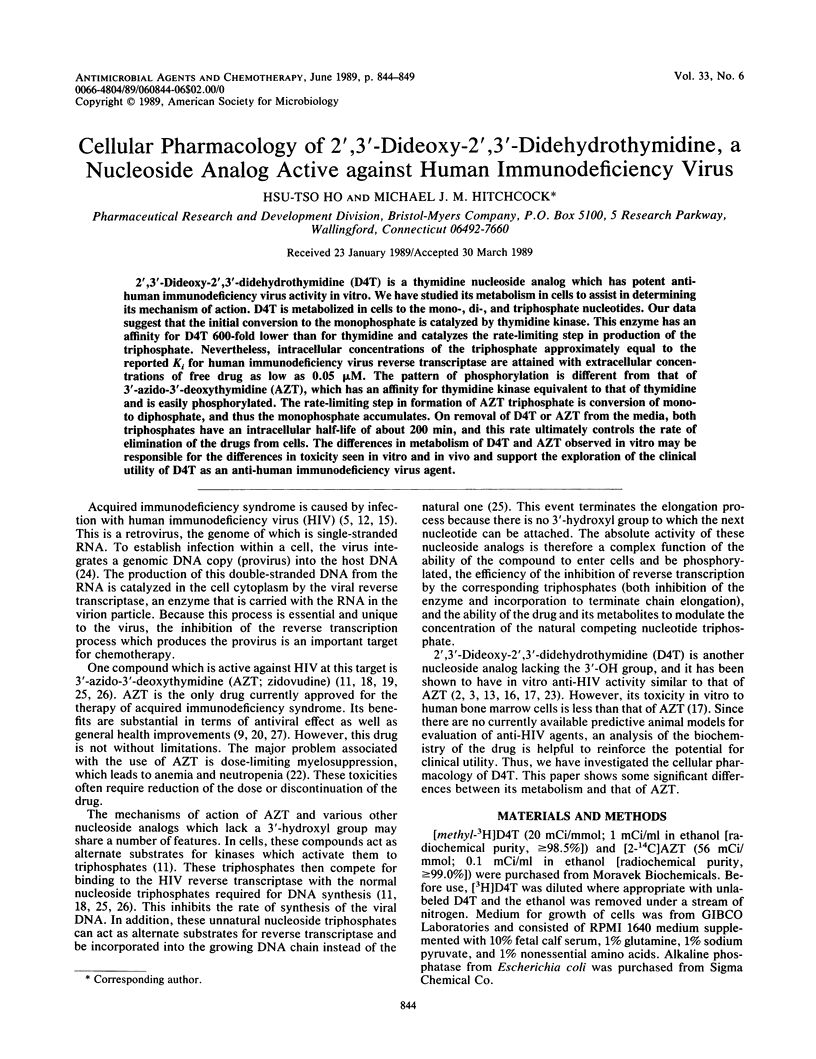
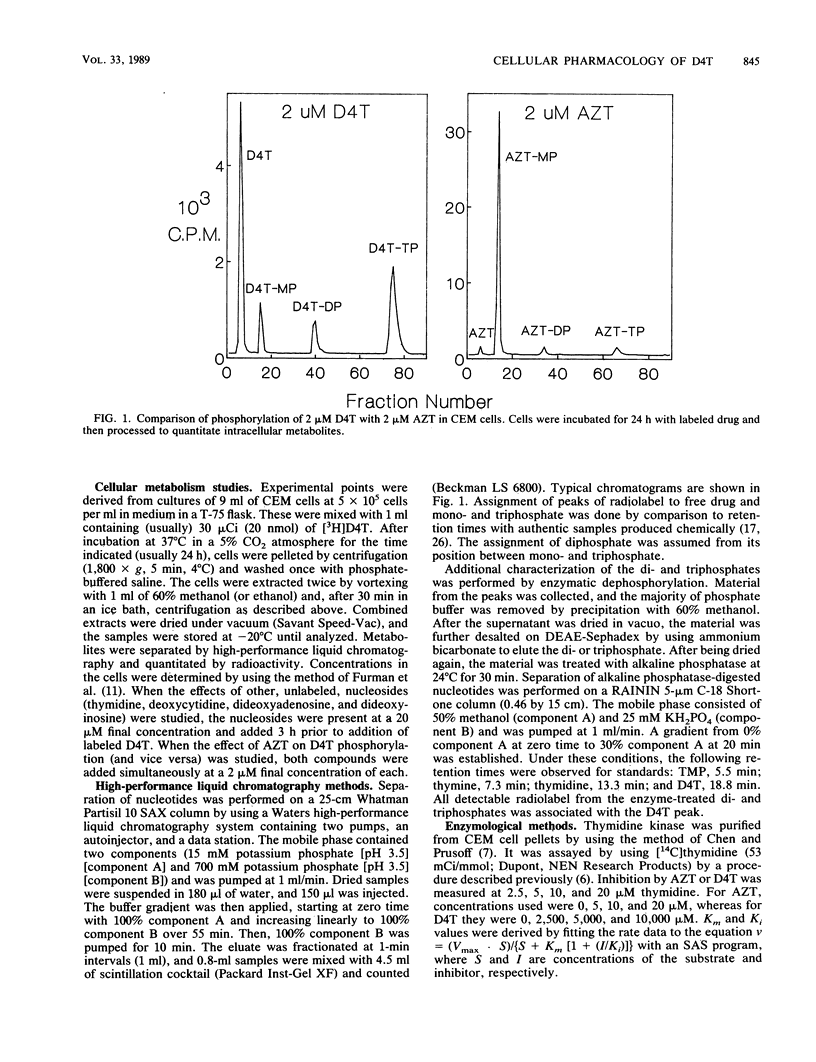
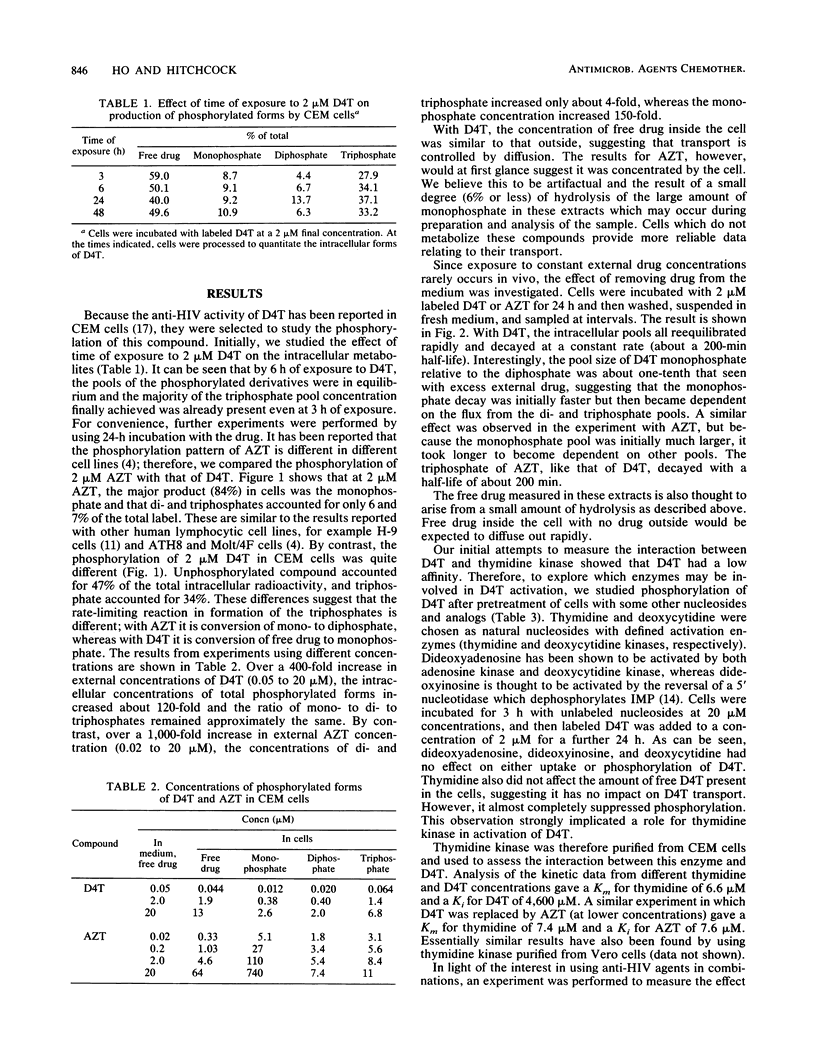
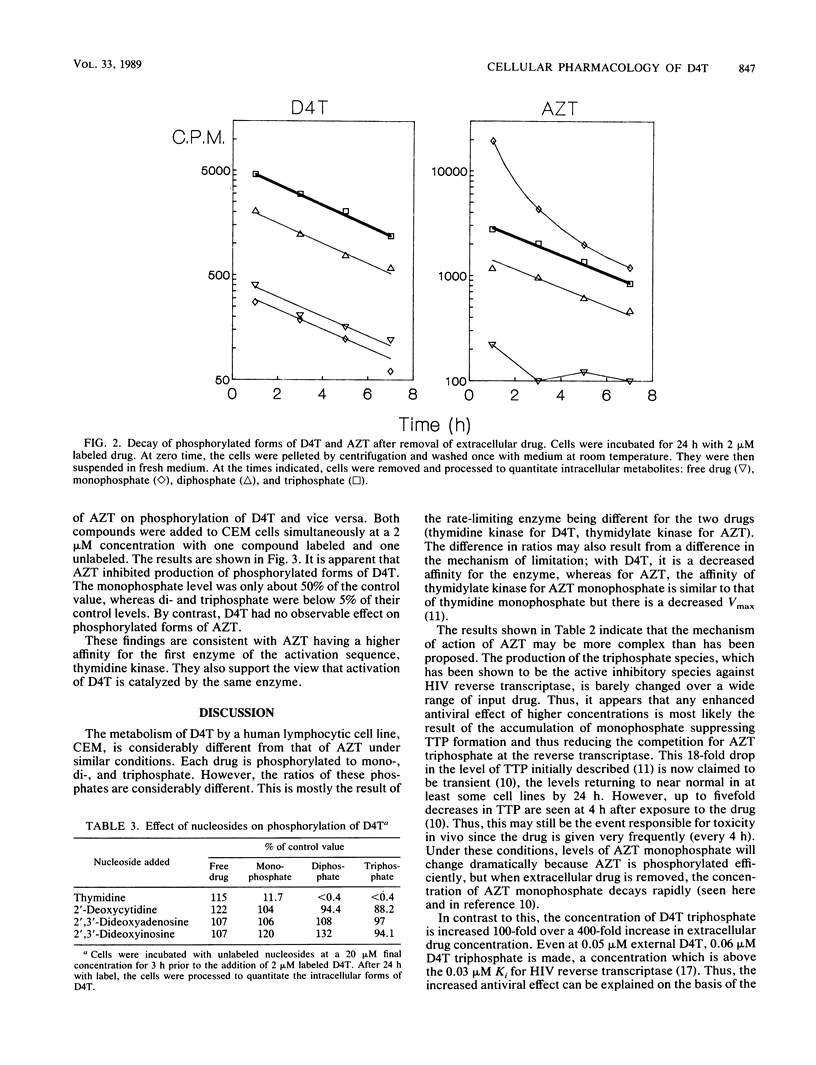
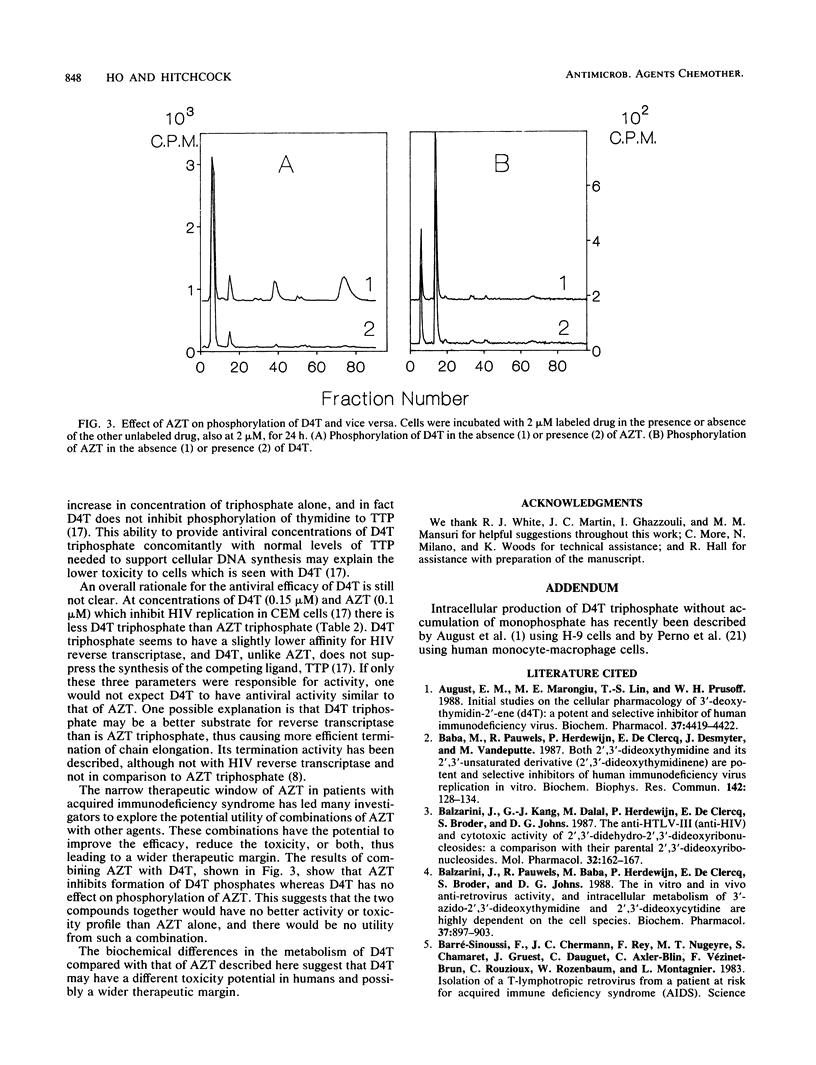
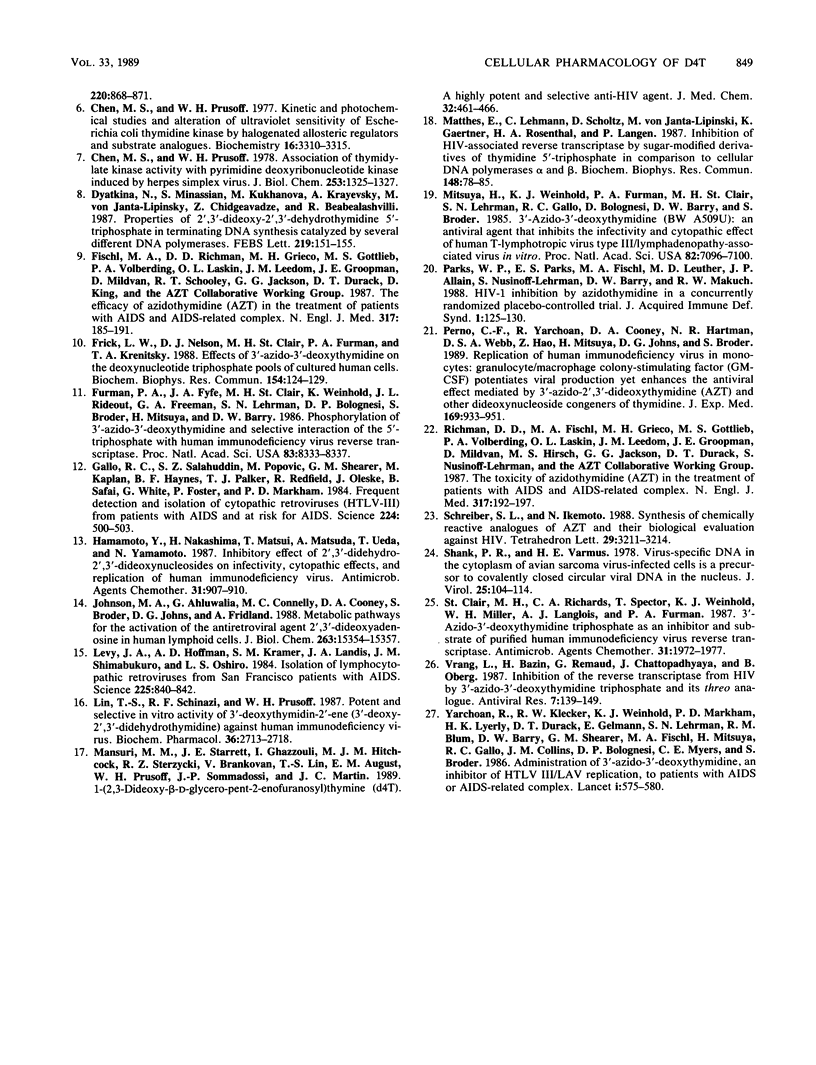
Selected References
These references are in PubMed. This may not be the complete list of references from this article.
- August E. M., Marongiu M. E., Lin T. S., Prusoff W. H. Initial studies on the cellular pharmacology of 3'-deoxythymidin-2'-ene (d4T): a potent and selective inhibitor of human immunodeficiency virus. Biochem Pharmacol. 1988 Dec 1;37(23):4419–4422. doi: 10.1016/0006-2952(88)90655-7. [DOI] [PubMed] [Google Scholar]
- Baba M., Pauwels R., Herdewijn P., De Clercq E., Desmyter J., Vandeputte M. Both 2',3'-dideoxythymidine and its 2',3'-unsaturated derivative (2',3'-dideoxythymidinene) are potent and selective inhibitors of human immunodeficiency virus replication in vitro. Biochem Biophys Res Commun. 1987 Jan 15;142(1):128–134. doi: 10.1016/0006-291x(87)90460-8. [DOI] [PubMed] [Google Scholar]
- Balzarini J., Kang G. J., Dalal M., Herdewijn P., De Clercq E., Broder S., Johns D. G. The anti-HTLV-III (anti-HIV) and cytotoxic activity of 2',3'-didehydro-2',3'-dideoxyribonucleosides: a comparison with their parental 2',3'-dideoxyribonucleosides. Mol Pharmacol. 1987 Jul;32(1):162–167. [PubMed] [Google Scholar]
- Balzarini J., Pauwels R., Baba M., Herdewijn P., de Clercq E., Broder S., Johns D. G. The in vitro and in vivo anti-retrovirus activity, and intracellular metabolism of 3'-azido-2',3'-dideoxythymidine and 2',3'-dideoxycytidine are highly dependent on the cell species. Biochem Pharmacol. 1988 Mar 1;37(5):897–903. doi: 10.1016/0006-2952(88)90178-5. [DOI] [PubMed] [Google Scholar]
- Chen M. S., Prusoff W. H. Association of thymidylate kinase activity with pyrimidine deoxyribonucleoside kinase induced by herpes simplex virus. J Biol Chem. 1978 Mar 10;253(5):1325–1327. [PubMed] [Google Scholar]
- Chen M. S., Prusoff W. H. Kinetic and photochemical studies and alteration of ultraviolet sensitivity of Escherichia coli thymidine kinase by halogenated allosteric regulators and substrate analogues. Biochemistry. 1977 Jul 26;16(15):3310–3315. doi: 10.1021/bi00634a005. [DOI] [PubMed] [Google Scholar]
- Dyatkina N., Minassian S., Kukhanova M., Krayevsky A., von Janta-Lipinsky M., Chidgeavadze Z., Beabealashvilli R. Properties of 2',3'-dideoxy-2',3'-dehydrothymidine 5'-triphosphate in terminating DNA synthesis catalyzed by several different DNA polymerases. FEBS Lett. 1987 Jul 13;219(1):151–155. doi: 10.1016/0014-5793(87)81208-5. [DOI] [PubMed] [Google Scholar]
- Fischl M. A., Richman D. D., Grieco M. H., Gottlieb M. S., Volberding P. A., Laskin O. L., Leedom J. M., Groopman J. E., Mildvan D., Schooley R. T. The efficacy of azidothymidine (AZT) in the treatment of patients with AIDS and AIDS-related complex. A double-blind, placebo-controlled trial. N Engl J Med. 1987 Jul 23;317(4):185–191. doi: 10.1056/NEJM198707233170401. [DOI] [PubMed] [Google Scholar]
- Frick L. W., Nelson D. J., St Clair M. H., Furman P. A., Krenitsky T. A. Effects of 3'-azido-3'-deoxythymidine on the deoxynucleotide triphosphate pools of cultured human cells. Biochem Biophys Res Commun. 1988 Jul 15;154(1):124–129. doi: 10.1016/0006-291x(88)90659-6. [DOI] [PubMed] [Google Scholar]
- Furman P. A., Fyfe J. A., St Clair M. H., Weinhold K., Rideout J. L., Freeman G. A., Lehrman S. N., Bolognesi D. P., Broder S., Mitsuya H. Phosphorylation of 3'-azido-3'-deoxythymidine and selective interaction of the 5'-triphosphate with human immunodeficiency virus reverse transcriptase. Proc Natl Acad Sci U S A. 1986 Nov;83(21):8333–8337. doi: 10.1073/pnas.83.21.8333. [DOI] [PMC free article] [PubMed] [Google Scholar]
- Gallo R. C., Salahuddin S. Z., Popovic M., Shearer G. M., Kaplan M., Haynes B. F., Palker T. J., Redfield R., Oleske J., Safai B. Frequent detection and isolation of cytopathic retroviruses (HTLV-III) from patients with AIDS and at risk for AIDS. Science. 1984 May 4;224(4648):500–503. doi: 10.1126/science.6200936. [DOI] [PubMed] [Google Scholar]
- Hamamoto Y., Nakashima H., Matsui T., Matsuda A., Ueda T., Yamamoto N. Inhibitory effect of 2',3'-didehydro-2',3'-dideoxynucleosides on infectivity, cytopathic effects, and replication of human immunodeficiency virus. Antimicrob Agents Chemother. 1987 Jun;31(6):907–910. doi: 10.1128/aac.31.6.907. [DOI] [PMC free article] [PubMed] [Google Scholar]
- Johnson M. A., Ahluwalia G., Connelly M. C., Cooney D. A., Broder S., Johns D. G., Fridland A. Metabolic pathways for the activation of the antiretroviral agent 2',3'-dideoxyadenosine in human lymphoid cells. J Biol Chem. 1988 Oct 25;263(30):15354–15357. [PubMed] [Google Scholar]
- Levy J. A., Hoffman A. D., Kramer S. M., Landis J. A., Shimabukuro J. M., Oshiro L. S. Isolation of lymphocytopathic retroviruses from San Francisco patients with AIDS. Science. 1984 Aug 24;225(4664):840–842. doi: 10.1126/science.6206563. [DOI] [PubMed] [Google Scholar]
- Lin T. S., Schinazi R. F., Prusoff W. H. Potent and selective in vitro activity of 3'-deoxythymidin-2'-ene (3'-deoxy-2',3'-didehydrothymidine) against human immunodeficiency virus. Biochem Pharmacol. 1987 Sep 1;36(17):2713–2718. doi: 10.1016/0006-2952(87)90253-x. [DOI] [PubMed] [Google Scholar]
- Mansuri M. M., Starrett J. E., Jr, Ghazzouli I., Hitchcock M. J., Sterzycki R. Z., Brankovan V., Lin T. S., August E. M., Prusoff W. H., Sommadossi J. P. 1-(2,3-Dideoxy-beta-D-glycero-pent-2-enofuranosyl)thymine. A highly potent and selective anti-HIV agent. J Med Chem. 1989 Feb;32(2):461–466. doi: 10.1021/jm00122a029. [DOI] [PubMed] [Google Scholar]
- Matthes E., Lehmann C., Scholz D., von Janta-Lipinski M., Gaertner K., Rosenthal H. A., Langen P. Inhibition of HIV-associated reverse transcriptase by sugar-modified derivatives of thymidine 5'-triphosphate in comparison to cellular DNA polymerases alpha and beta. Biochem Biophys Res Commun. 1987 Oct 14;148(1):78–85. doi: 10.1016/0006-291x(87)91078-3. [DOI] [PubMed] [Google Scholar]
- Mitsuya H., Weinhold K. J., Furman P. A., St Clair M. H., Lehrman S. N., Gallo R. C., Bolognesi D., Barry D. W., Broder S. 3'-Azido-3'-deoxythymidine (BW A509U): an antiviral agent that inhibits the infectivity and cytopathic effect of human T-lymphotropic virus type III/lymphadenopathy-associated virus in vitro. Proc Natl Acad Sci U S A. 1985 Oct;82(20):7096–7100. doi: 10.1073/pnas.82.20.7096. [DOI] [PMC free article] [PubMed] [Google Scholar]
- Parks W. P., Parks E. S., Fischl M. A., Leuther M. D., Allain J. P., Nusinoff-Lehrman S., Barry D. W., Makuch R. W. HIV-1 inhibition by azidothymidine in a concurrently randomized placebo-controlled trail. J Acquir Immune Defic Syndr. 1988;1(2):125–130. [PubMed] [Google Scholar]
- Perno C. F., Yarchoan R., Cooney D. A., Hartman N. R., Webb D. S., Hao Z., Mitsuya H., Johns D. G., Broder S. Replication of human immunodeficiency virus in monocytes. Granulocyte/macrophage colony-stimulating factor (GM-CSF) potentiates viral production yet enhances the antiviral effect mediated by 3'-azido-2'3'-dideoxythymidine (AZT) and other dideoxynucleoside congeners of thymidine. J Exp Med. 1989 Mar 1;169(3):933–951. doi: 10.1084/jem.169.3.933. [DOI] [PMC free article] [PubMed] [Google Scholar]
- Richman D. D., Fischl M. A., Grieco M. H., Gottlieb M. S., Volberding P. A., Laskin O. L., Leedom J. M., Groopman J. E., Mildvan D., Hirsch M. S. The toxicity of azidothymidine (AZT) in the treatment of patients with AIDS and AIDS-related complex. A double-blind, placebo-controlled trial. N Engl J Med. 1987 Jul 23;317(4):192–197. doi: 10.1056/NEJM198707233170402. [DOI] [PubMed] [Google Scholar]
- Shank P. R., Varmus H. E. Virus-specific DNA in the cytoplasm of avian sarcoma virus-infected cells is a precursor to covalently closed circular viral DNA in the nucleus. J Virol. 1978 Jan;25(1):104–104. doi: 10.1128/jvi.25.1.104-104.1978. [DOI] [PMC free article] [PubMed] [Google Scholar]
- St Clair M. H., Richards C. A., Spector T., Weinhold K. J., Miller W. H., Langlois A. J., Furman P. A. 3'-Azido-3'-deoxythymidine triphosphate as an inhibitor and substrate of purified human immunodeficiency virus reverse transcriptase. Antimicrob Agents Chemother. 1987 Dec;31(12):1972–1977. doi: 10.1128/aac.31.12.1972. [DOI] [PMC free article] [PubMed] [Google Scholar]
- Vrang L., Bazin H., Remaud G., Chattopadhyaya J., Oberg B. Inhibition of the reverse transcriptase from HIV by 3'-azido-3'-deoxythymidine triphosphate and its threo analogue. Antiviral Res. 1987 Mar;7(3):139–149. doi: 10.1016/0166-3542(87)90002-7. [DOI] [PubMed] [Google Scholar]
- Yarchoan R., Klecker R. W., Weinhold K. J., Markham P. D., Lyerly H. K., Durack D. T., Gelmann E., Lehrman S. N., Blum R. M., Barry D. W. Administration of 3'-azido-3'-deoxythymidine, an inhibitor of HTLV-III/LAV replication, to patients with AIDS or AIDS-related complex. Lancet. 1986 Mar 15;1(8481):575–580. doi: 10.1016/s0140-6736(86)92808-4. [DOI] [PubMed] [Google Scholar]



